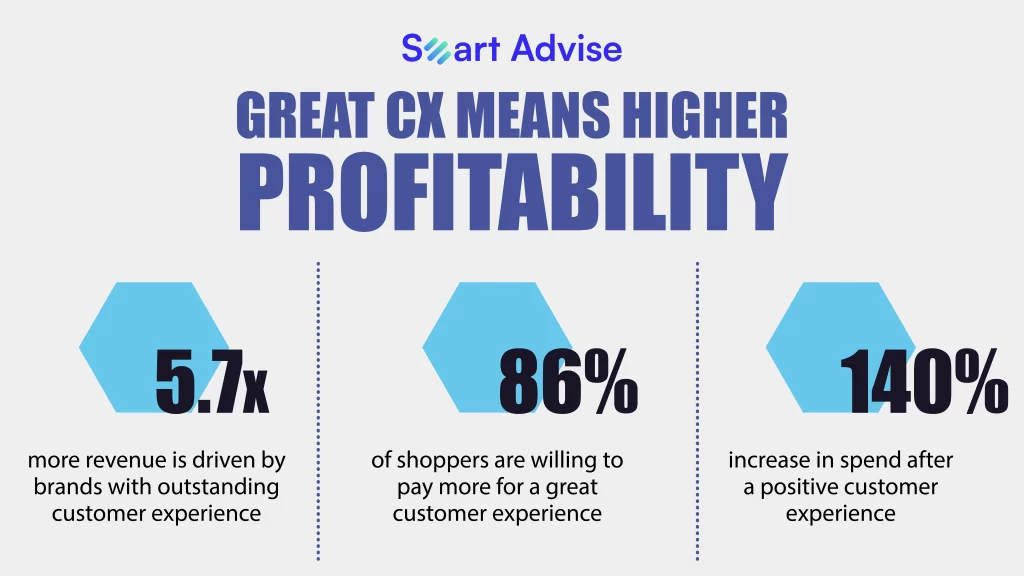
A study suggests a great customer experience drives businesses to greater revenue and profitability, resulting in long-lasting relationship with their customers
Within the complex web of business, where each company tries to provide a solution to a problem, an important issue lingers: What happens when the customer experience isn’t perfectly integrated with the solution? In such a confusing situation, how can a business find a way out? Not only does the product matter, but so does the skill required to create an engaging and anticipating experience for the consumer. It turns out that in the world of business today, the customer experience is the secret to keeping customers engaged and committed. In this review, we piece together the complexities of this puzzle, revealing the critical function of customer experience in solving issues and turning them into chances for long-term relationships.
Customer Experience Rise: From Transactional to Experiential
Gone are the days when customer interactions were limited to mere transactions. The contemporary consumer demands more – they crave an experience. According to a report by Forrester, 72% of businesses say that improving customer experience is their top priority. This shift is a testament to the realization that customer experience is no longer a peripheral aspect but a critical differentiator in a crowded marketplace.

(Source: eduMe)
Building Blocks of Advanced Customer Experience
Personalization Matters:
Personalization is at the forefront of delivering an exceptional customer experience. 80% of customers are more likely to buy when companies provide customized experiences, according to research by Epsilon. Businesses can use data analytics and AI to understand customer preferences and behaviors, tailoring their offerings accordingly.
Omni-channel Engagement:
Modern consumers seamlessly switch between various channels such as social media, websites, and mobile apps. Maintaining consistency across all of these platforms is of paramount importance. A survey by Salesforce found that 79% of customers expect consistent experiences across multiple channels.
Proactive Customer Service:
Being proactive in customer service means thinking about what customers need and fixing problems before they ever happen. Understanding customer pain points is crucial in this approach, allowing businesses to analyze customer behavior, feedback, and past interactions to identify potential challenges. By incorporating personalized engagement and using predictive analytics, companies can tailor their interactions, offering relevant solutions and recommendations before issues escalate.
Facts & Figures
1. Increased Revenue:
According to a report by Adobe, Companies who went “all in” on experience saw 1.4 times quicker revenue growth and 1.6 times higher customer lifetime value than those that didn’t. This investment included not just technology, but also the people and procedures needed to support it.
2. Word-of-Mouth Influence:
Positive customer experiences have a domino effect on brand promotion. A survey by Nielsen found that 92% of consumers trust recommendations from friends and family over other forms of advertising. Satisfied customers become brand advocates, significantly influencing others in their network.
3. Impact on Customer Loyalty:
The basis of any successful company is its loyal clientele. According to Temkin Group (Published in EduMe) discovered that companies earning $1 billion annually can expect to earn, on average, an additional $700 million within three years of investing in customer experience. This underscores the long-term financial impact of prioritizing customer satisfaction.
How Leading Brands Excel in Customer Experience
1. Amazon:
Amazon’s success is attributed not only to its vast product selection but also to its customer-centric approach. The e-commerce giant employs sophisticated algorithms to provide personalized recommendations, making each customer’s journey unique. As a result, Amazon boasts a 64% customer retention rate, well above the industry average.
2. Apple:
Apple has set the benchmark for seamless omni-channel experiences. Whether a customer is purchasing a product online, in-store, or through their mobile app, the process is consistent and user-friendly. Apple’s commitment to design and user experience has created a fiercely loyal customer base, contributing to its global dominance.
What Technology Can Do to Influence the Customer Experience
The digital age has given rise to an array of technologies that businesses can employ to enhance customer experience. Artificial Intelligence (AI), chatbots, and data analytics are instrumental in understanding customer behavior, predicting preferences, and delivering personalized interactions.
Accenture found that 75 percent of customers are more likely to make a purchase from a store that knows their name, offers suggestions based on their previous purchases, or recalls their purchase history. This level of personalization is achievable through AI algorithms that analyze large datasets to draw meaningful insights.
Challenges and Considerations in Improving Customer Experience
While the benefits of enhanced customer experience are evident, businesses must navigate challenges to implement successful strategies. These challenges include:
Data Security and Privacy:
As businesses collect and utilize customer data, ensuring its security and respecting privacy become paramount. A breach of trust in this area can have severe consequences, damaging the brand’s reputation.
Integration of Technologies:
Implementing and integrating advanced technologies into existing systems can be complex. Businesses must carefully plan and execute the integration to avoid disruptions in customer service.
Conclusion
Providing a product to solve a problem is just the beginning as we cruise through the commercial bodies of water. A solution that goes beyond a simple transaction and becomes an experience is necessary for a company’s actual journey to success. A client’s experience plays a crucial part in determining a company’s fate, as shown by this look into the complexities of client involvement. It’s not enough to just fix things; proactive service, empathy, and finesse are prerequisites. The faster one learns this, the faster they move ahead, and to get this success at pace, Connect with us at Smart Advise right now!